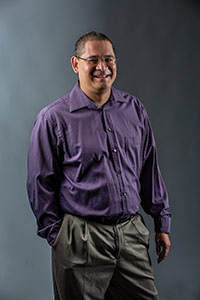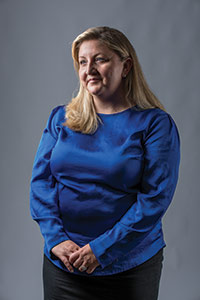Bursting the Communication Bubble
In a culture dominated by diverse voices and divisive opinions, the need for ethical communication has never been greater
Scrolling through a list of movies personally recommended for him, Bert Ballard attempts to find something that will pull him in and entertain him for a while. After a long day of teaching, he needs something to help clear his mind.
 “I don’t watch movies to think. Thinking is a big part of my job. I want to come home
and watch something with a simple narrative that I know is not realistic,” says the
associate professor of communication at Seaver College.
“I don’t watch movies to think. Thinking is a big part of my job. I want to come home
and watch something with a simple narrative that I know is not realistic,” says the
associate professor of communication at Seaver College.
Although the precise algorithms of popular streaming services offer an abundance of recommendations that align with Ballard’s personal preferences, he admittedly is missing out on exposure to a number of other genres available to stream.
While computer-generated formulas and numeric sequences are responsible for these filtering systems, individuals around the world are creating their own “filter bubbles”—a sort of intellectual isolation that results when algorithms only display content based on a user’s personal preferences—containing only the information and news they consume and the conversations they engage in.
Filter bubbles, and their perpetuation of an environment where individuals choose to only consume or be exposed to information that complies with their existing beliefs, present a challenge for communication ethicists like Ballard. He explains that creating a space for an opposing viewpoint to be shared allows for another to be heard and that making an effort to truly hear one another, without disruption or interruption, is a personal decision that results in better understanding.
“In a world where it’s easy to just talk to people who are like you, it takes courage—that ethical difference—to be a little different and to look at viewpoints that differ from your own,” Ballard says. One way to burst the filter bubble, he recommends, is to cultivate diverse news sources that present differing viewpoints while being mindful of the source.
 Elizabeth Smith (MA ’03, EdD ’16), assistant professor of communication at Seaver
College and director of Pepperdine Graphic Media, agrees. “While ‘fake news’ has been
around as long as news has, we now have much more access many different voices,” she explains. People are consuming news at such a high frequency that they’re just
not paying much attention to where it’s coming from.”
Elizabeth Smith (MA ’03, EdD ’16), assistant professor of communication at Seaver
College and director of Pepperdine Graphic Media, agrees. “While ‘fake news’ has been
around as long as news has, we now have much more access many different voices,” she explains. People are consuming news at such a high frequency that they’re just
not paying much attention to where it’s coming from.”
Consuming content from verified news sources across a variety of social media channels
can be a challenging practice to adopt at first, Ballard notes. However, learning
more about opposing perspectives does not equate with one having
to suspend his or her own beliefs or values.
“Understanding does not preclude disagreement,” he says. “It’s okay to disagree. Disagreement is healthy. The problem arises when we think that disagreement means we’re losing or that we can’t be a part of a conversation.”
At its most basic level, Ballard explains that the central tenet of communication ethics is concerned with “the nature of how others impact us and how we impact others.” Messages posted on online forums are important considerations as the culture of social media often facilitates an environment where comments can easily be taken out of context or reach an audience that they were not originally intended for.
In an online disagreement, participants lose the urge to be sensitive or to grant the opposing side a chance to be heard. “Social media makes that worse,” Ballard says. “I can tell you what I think and I don’t have to listen to what you say. If I disagree with you, I can just block or unfriend you.”
This form of one-sided communication harms a core component of democracy—the ability to acknowledge multiple beliefs and engage civilly. Both Ballard and Smith agree that important conversations need to take place offline and in person.
In an effort to bring students together in a physical space to discuss controversial issues offline, Pepperdine Graphic Media hosted a town hall series on the Malibu campus last year focusing on timely topics including DACA, veterans, cultural diversity on campus, and the Higher Education Act of 1965. Each session was moderated by Seaver College senior Kelly Rodriguez (’18) and concluded with a question and answer session. The goal of the series was not for all students to leave in agreement, but rather for them to have a better understanding of the issues being discussed. Although a variety of viewpoints were represented during each session, participants were able to discourse respectfully.
“Knowing that Pepperdine is growing in diversity, the ability to create a space to build bridges in the face of differences becomes a must,” Rodriguez says.
Smith plans to bring back the town hall series this year and says, “It’s so important that, as educated people, we are coming out of the University being able to hear differing viewpoints and being able to express ourselves in a civil manner.”
In addition to a willingness to foster respectful and face-to-face dialogue, Ballard shares that the next generation needs to be better prepared to handle conflict. At its core, education at the elementary level is designed to prepare students for the three Rs: reading, writing, and arithmetic. In an effort to better prepare younger generations for interpersonal conflict and encourage productive discourse, Ballard recommends adding an additional R to the curriculum: relationships.
“Relationship skills that focus on how to deal with conflict, how to foster resilience, and how to take responsibility in your speech both on and offline are important for navigating life and recognizing that you can’t just tweet things or post things without it having an impact somehow,” he shares.
In a society where messages can be communicated with the click of a button and new information can be consumed as soon as a page refreshes, the need to be mindful of one’s impact, more intentional with how one communicates, and more discerning about how one chooses to receive communication has never been greater.
While algorithms and technological advances continue to alter the medium, frequency, and audience one communicates and engages with, Ballard offers one simple message: “Slow down and dare to be just a little different than what the world would have you be.”
